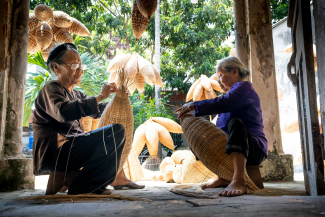The quiet outside the nondescript warehouse belies what is happening inside. Machines whir, and halls and walls are piled high with filled sacks of sesame, of chickpeas, of mung beans.
Tewodros Yilma owns Alpha Trading, with offices in Addis Ababa and this warehouse in Adama, about 80 kilometers away. In business for 20 years, he exports a range of what are termed “oil seeds”, as well as spices and coffee.
“When I started those products were highly in demand and the market was so good… At that time our resources were very much limited so our activity was also limited. Over the years we grew our market and our consumer base, and our customer base has grown at the same time,” he said.
Yilma’s business is just one example of Ethiopia’s push for value addition to boost its trade, meaning to increase the worth of a product by processing or packaging or branding, to name a few examples.
Assefa Mulugeta, Director General of Export Promotions at Ethiopia’s Ministry of Trade and Industry, said, “A government priority area is value addition, like manufacturing, agro-processing and others. But manufacturing is not simple, and penetrating the market is not simple. We are working on agriculture but if we can we would like to move into manufacturing.”
“For example, more than 95% of our coffee is sold just raw as green coffee. But we want to roast it and have another way of selling it but that needs technology, it needs markets, it needs logistics.”
At the Alpha Trading warehouse, machines sort and dry chickpeas, funnelling them into sacks labelled for different markets. Other oil seeds move through processors, set to weed out poor quality product and shake away rocks and dirt. A dozen or so employees carry processed goods already packaged here and there, while others monitor the machines and recalibrate based on the seed or pulse.
Ethiopia completed a trade analysis in 2015 that recommended a focus on exports and manufacturing, as the country continues to achieve economically.
Mesgenu Arga Moach, State Minister of Ethiopia’s Ministry of Trade and Industry, said, “The main focus of our homegrown economic reform is developing and expanding our export capacity, diversifying our exports and bridging the trade deficit. We are largely exporting agricultural products, but our focus is value addition, processing and connecting with international value chains – that is very much important.”
Agriculture employed approximately 66% of Ethiopia’s population in 2019, according to the World Bank, and contributed 34% to GDP. The country’s exports are primarily unprocessed commodities, including the oil seeds and pulses that Yilma deals in.
The share of agro-processing in Ethiopia’s GDP remains low, and the 2015 trade study notes the country is not achieving up to its potential, flagging the need to enhance the supply chain and the integration between farmers and the industry like processors and exporters. It also notes the need for a quality standards mechanism.
Yilma buys his raw product from Ethiopia’s Commodity Exchange (ECX), where buyers and sellers can now meet electronically. For items that are not on the ECX, he purchases directly from farmers. But he stressed the need for more agricultural outputs and that they are of higher quality.
"As a country we have a huge potential, and there are huge markets out there. And I believe that if we utilise all these resources there will be a lot of market for us,” he said.
As to standards, Alpha Trading adheres to the certification and sanitary requirements of its various markets, whether the US, Europe or Japan. But this is something that is an obstacle for those interested in getting into the business, as well as the challenge of obtaining the large and expensive processing machines necessary.
“We have largely agro-based export products but we are aspiring to be the light manufacturing hub in Africa. We are developing and expanding our manufacturing industries, and particular attention is given to the industrial parks. The manufacturing sector is steadily growing and we are expanding our manufacturing exports using different market access such as textile products, and those products coming from industrial parks now are destined to different markets,” Moach said of the move to constructing industrial parks that lie just outside Addis.
Asked about what he hopes for the country export future, Yilma said, “Increase our production. Encourage our farmers. Create awareness. With all these combined we can achieve all the targets.”
If you would like to reuse any material published here, please let us know by sending an email to EIF Communications: eifcommunications@wto.org.


